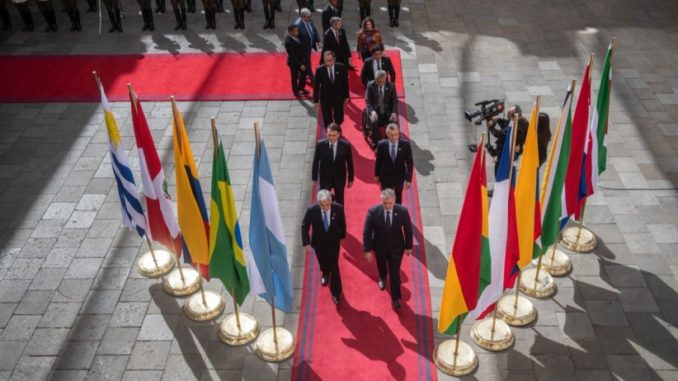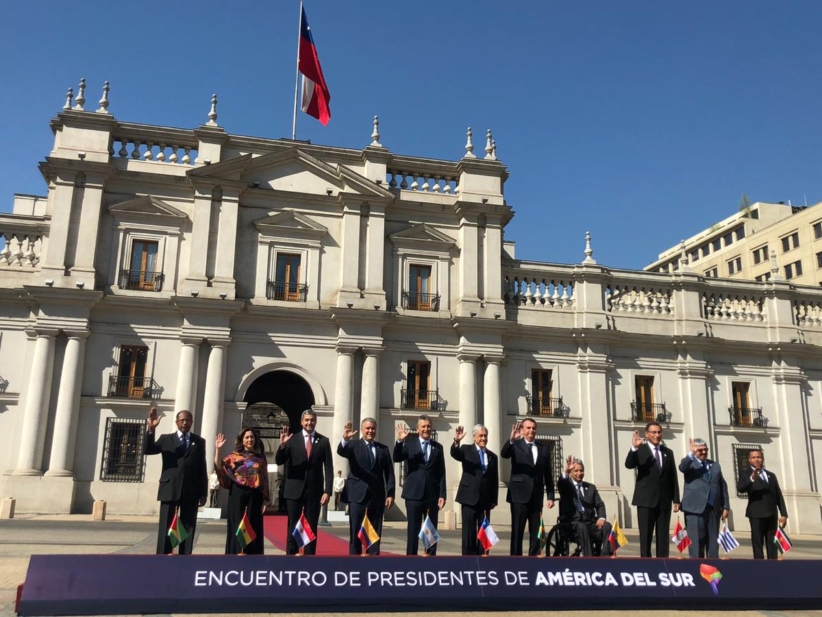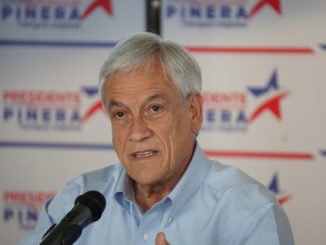
SANTIAGO – South American countries on Friday launched the Forum for the Progress of South America (Prosur), a new regional bloc which seeks the “integration and strengthening of the region.”
Presidents and representatives from Chile, Colombia, Brazil, Peru, Ecuador, Argentina, Paraguay and Guyana signed a joint declaration to create “a regional space of coordination and cooperation, without exclusion of ideologies” at a meeting in Santiago.

The bloc intends to “advance toward a more effective integration, that allows contribution to growth, progress and development” for the nations, said the declaration.
Prosur was driven by conservatives Chilean President Sebastian Piñera and Colombian President Ivan Duque, with a goal of strengthening regional ties and replacing the 12-member Union of South American Nations (Unasur) which started in 2008 under the influence on then Venezuelan populist president Hugo Chavez and Lula da Silva from Brazil.
Hoy, con creación de #Prosur dimos un gran paso para un mejor diálogo, colaboración e integración de América del Sur. Así podremos enfrentar unidos y mejor los problemas del presente y desafíos del futuro, y crear más oportunidades y mejor calidad de vida a nuestros compatriotas. pic.twitter.com/qsWORHcxLt
— Sebastian Piñera (@sebastianpinera) March 22, 2019
Here the 6 points of the final declaration:
1. Our willingness to build and consolidate a regional space of coordination and cooperation, without exclusions, to move towards a more effective integration that allows us to contribute to the growth, progress and development of the countries of South America.
2. Our recognition of the proposal to create a space for South American dialogue and collaboration, the Forum for the Progress of South America (Prosur), and we instruct the Ministers of Foreign Affairs to deepen the dialogue in accordance with the terms of this Declaration.
3. That this space should be gradually implemented, have a flexible structure, light, inexpensive, with clear operating rules and an agile decision-making mechanism that allows South America to advance in understandings and concrete integration programs based on the common interests of the States and according to their own national realities.
4. That this space will address in a flexible manner the priority issues of integration in the areas of infrastructure, energy, health, defense, security and crime, prevention and management of natural disasters.
5. That the essential requirements to participate in this space will be the full validity of democracy, of the respective constitutional orders, respect for the principle of separation of the Powers of the State, and the promotion, protection, respect and guarantee of human rights and fundamental freedoms, as well as the sovereignty and territorial integrity of States, with respect to international law.
6. That the Republic of Chile will hold the Pro Tempore Presidency of this process during the next 12 months, and then it will be delivered to the Republic of Paraguay.
Prosur is a forum “without ideology and bureaucracy, but with a total commitment to freedom, democracy and human rights,” Piñera said on Friday.
“It had been more than five years since the Presidents and their representatives of South America did not meet, and I think it is absolutely necessary, urgent, to have an instance to be able to dialogue, to be able to coordinate, to be able to find ways of collaboration, to be able to favor the integration and development of our peoples,” he added.
The alliance would provide a forum for South American countries to work together, make their voices heard and achieve more freedom, integration and development, he further said.
Piñera also highlighted the regional commitment to democracy and progress: “We want it to be a forum without ideologies, we want it to be a forum without bureaucracy, we want it to be a forum for a frank and direct dialogue, but we want this forum to have a strong and clear commitment to the principles of freedom, democracy and respect for human rights. That is not ideology, those are values and principles,” said the Chilean Head of State.
El Presidente @sebastianpinera valoró los avances para la integración en América del Sur tras encuentro de Mandatarios en Santiago: “Ha sido un buen día para la colaboración, el diálogo, el entendimiento y la integración”. Los detalles de la jornada en: https://t.co/OBGXea9Ew9 pic.twitter.com/H1TiIUCasb
— Prensa Presidencia de Chile (@presidencia_cl) March 22, 2019
Chile will lead Prosur for one year before Paraguay takes the helm.
Bolivia and Uruguay did not join the group, Bolivia is a close ally of Venezuela and the Maduro regime and Uruguay will act as an observer since the ruling coalition is divided on the issue of Venezuela and the radicals led by ex-president Jose Mujica prevail since they have a greater representation in the Legislative.



